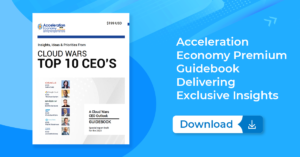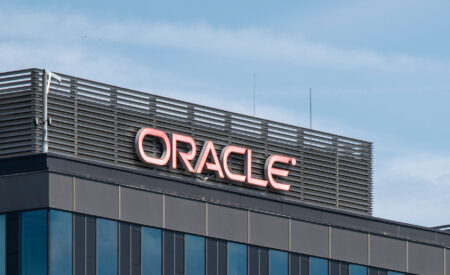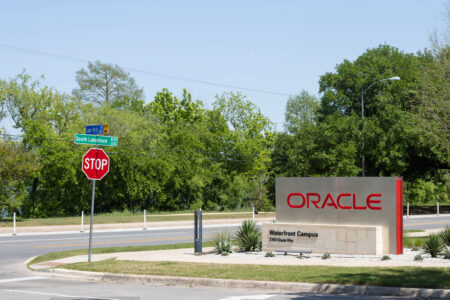
Wrapping up an extraordinary 24-year run as one of the most successful growth companies ever, Salesforce last week introduced Marc Benioff 2.0, a transformational CEO whose priorities of profits, cash flow, and productivity far outweigh the old Salesforce goal of growth.
I will miss the original Benioff, whose vision and drive and audacity were huge animating forces in the cloud revolution. But change comes to us all — as businesses and as individuals — and I hope Marc Benioff 2.0 can somehow find a way to experience as much joy in cranking down on expenses and telling financial analysts how wonderful they are as he did in revolutionizing the world of enterprise applications.
While Marc Benioff 2.0 — or, in an effort to be hip, can I call him MB2.0? — did everything humanly possible during Salesforce’s March 1 fiscal-Q4 earnings call to convince employees and customers and partners and investors that he’s tickled pink to dump the growth thing and take up the cost-control cudgel, I just don’t think you can put an acutely carnivorous tiger into a zebra costume and expect the tiger to become a docile plant-eater.
And if I were SAP or Oracle or Microsoft or Adobe or any of the dozens of smaller competitors in the CRM space, I would take the announcement of Salesforce’s “New Day” and the launch of MB2.0 as phenomenally good news — and I’d kick my competitive efforts into overdrive.
Because Salesforce, in the words of Marc Benioff himself, is much less interested in growth and market share than it used to be. From the March 1 earnings call, here is just one example of what MB2.0 is all about — and what it’s not all about:
“To wrap it up, our transformation is happening now. We’re making Salesforce one of the most profitable software companies in the world with one of the highest cash flows, and one of the very largest as well.”
No mention of the G-word in there — nada, zero, zippo. Now, it’s not like Salesforce has anything against revenue growth — certainly not — it’s just no longer a priority. The New Big Thing is margin growth — and there’s nothing wrong with that. But the pursuit of it as the overwhelming #1 priority of the company will make Salesforce a very different sort of animal.
I’m not saying that’s better or worse — but it certainly is different.
Again, here’s Benioff from the March 1 earnings call:
“Profitability is truly our #1 strategy, and that’s my #1 strategy. That’s what I’ve been focused on with the management team.
That is the #1 thing we talk about at the start of every meeting we have in this company. And that is why we were able to deliver on that in 90 days.
“You all know that we’ve never had an efficiency focus in the company before because we’ve had 24 incredible years of where we’ve had to just grow, grow, grow. There have been moments where we’ve had to pull back. ’01, ’02, bad recession, we had to pull back. ’08, ’09, we had to pull back and reassess.
“We’re kind of looking at this moment as, hey, we can reassess. This is an incredible moment. We can deliver great results.”
So what are those “great results” Benioff’s talking about? It’s sure not revenue — it’s margins. Again, not a darn thing wrong with that — but customers should understand that Salesforce is, under MB2.0, a very different type of company than it’s been in the past.
“You saw we’re delivering more than 10% revenue growth, but we want to deliver this more than 27% margin target… I think that’s amazing that we’ve delivered more than four points last year–not basis points—four points, and four and a half points this year.
“And that’s my main focus.”
That self-proclaimed “main focus” came through loud and clear across the entire earnings call as Benioff, who typically devotes most if not all of his earnings-call commentary to customers, flipped that model and talked extensively about internal operations with only a couple of mentions about customers.
Based on Benioff’s own words, that ratio could very well apply as well to how Benioff allocates his time over the next year as Salesforce plunges full-speed into its “New Day,” and that would mean he spends less time out in the market and more time inside the company focused on optimizing margins.
Here’s his overview of a new four-point strategic plan being unleashed within Salesforce, and you tell me if you see the words “customers” or “revenue growth” anywhere in here:
“We immediately put into place an accelerated transformation plan across four areas: short-term and long-term restructuring of the company; improving profitability and productivity; prioritizing our core innovations; and a deeper and even stronger relationship with our shareholders: you.”
If, at that point in the call, I had any doubts about whether this was indeed the launch of Marc Benioff 2.0, this comment from the Salesforce founder and CEO erased all such uncertainty. I mean, I’ve made no secret about the enormous respect I have for Larry Ellison — but it was a bit of a head-spinner to hear Benioff gush about Ellison and Oracle’s superb operating model during the middle of a pivotal earnings call.
Because the last time I looked, Oracle is one of Salesforce’s primary competitors — and this is just not how CEOs talk about competitors on an earnings call. But then again, this is MB2.0.
“I’ve gotten a lot of great coaching. I’ll just give a huge callout to my mentor, Larry Ellison, who has spent a lot of time with me, giving me the Oracle playbook. And I’m very grateful to him. He was the first person who texted me after the earnings came out today.
“I’ll tell you, it’s good to have friends in the world when things happen, and he’s been a great friend, and we’re executing that playbook to increase our margins. They obviously have best-of-class margins.
“So it’s great to have someone like that on your side.”
Final Thought
As I said at the top, I will miss the old Marc Benioff — in addition to being an extraordinary leader and visionary and pioneer, he was also something of a stir-it-up rascal, a lovable rogue, and someone who constantly pushed the boundaries of this crazy business for the benefit of his company and its customers.
But more than that, I wish Marc Benioff all the best in his new self-appointed role. It’s not easy to transform yourself at the age of 58, and it’s not like Benioff needs the job to meet the mortgage.
No, he’s doing it because he feels it’s the right thing for the company he created, and Benioff — at least for now — appears to be fully willing to subjugate his own personal preferences for what’s best for the company.
But I’m willing to bet that when those competitors put the fangs out and start coming at Salesforce more aggressively and more relentlessly than ever before, we will see some flashes of the original Marc Benioff.
Because a tiger in a zebra costume is still, without question, a tiger.
To hear more data modernization, AI/hyperautomation, cybersecurity, and growth strategies from CIO practitioners, tune into Acceleration Economy’s Digital CIO Summit, which takes place April 4-6. Register for the free event here.










